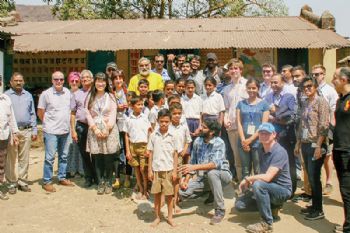
The Sunrise Project — a Swansea University-led (
www.swansea.ac.uk) initiative to help communities in developing countries generate their own solar power — has been awarded £800,000 by the UK Government.
This will be used to construct prototype buildings and support collaboration between researchers in the UK, India, Kazakhstan, Mexico and South Africa. Solar energy is crucial in the shift towards green power — in just one hour, enough solar energy hits the Earth to meet the energy needs of the entire world for a year.
Most solar-energy technologies have been manufactured from silicon, which takes a lot of money and energy to produce, but a new breakthrough — in the form of a perovskite solar cell — could be a game-changer.
It is cheap to produce — using widely available materials — and is very flexible, as it can be printed directly onto a base.
Recent laboratory studies have also shown that the latest perovskite cells are highly efficient.
The Sunrise Project will construct two ‘demonstrator’ buildings in India — like the Active Buildings on Swansea University campus, which generate, store and release their own power — to show that the technology works.
It will then be extended to include Kazakhstan, Mexico and South Africa, with researchers from those countries spending a year at Swansea University to learning about how best to bring this new technology to market.
Adrian Walters from the Sunrise Project said: “Our research is about putting clean, affordable and reliable power into the hands of local communities.
“The funding means we can build not just expertise but actual buildings, which will show whether perovskite solar cells can be produced at commercially viable scale and cost.
"If this goal is achieved, it will present a global opportunity to address climate change and pollution issues associated with conventional power generation.”